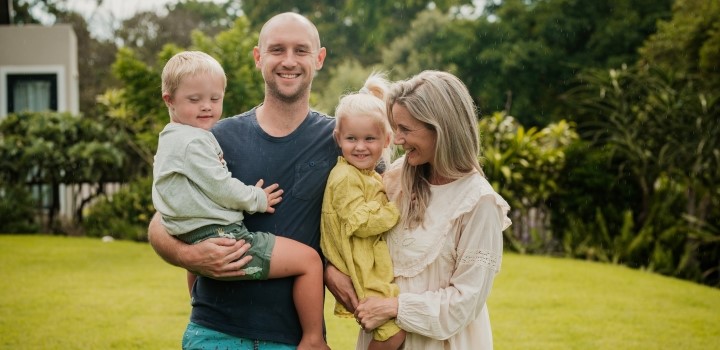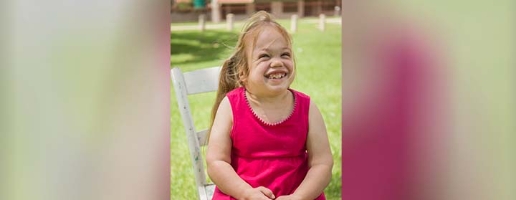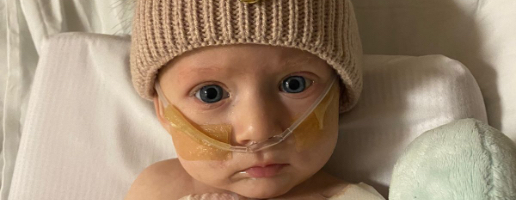Jessica's journey 'Learning from Luke'

For Jessica and Jonathan Roberts, having a firstborn with Down syndrome has profoundly enhanced their world, bringing grit, resilience, and great joy to their lives. It's been a tough six years, with hard decisions and juggling fulltime jobs with caring for Luke and his two younger siblings. Yet the couple wouldn't have it any other way.
The beginning of their journey.
Jessica and Jonathan's journey began with the hardest decision of all.
When Jess was 22 weeks pregnant, a routine scan picked up a minor foetal abnormality. This led to further specialist investigations and an amniocentesis. They were then told that their unborn child had a 99.9% certainty of being born with Down Syndrome, a genetic disorder in which a child is born with an extra copy of their 21st chromosome.
"There was no way I could terminate this life growing inside me"
"It was a shock to find ourselves in the neonatologists' rooms having to decide almost immediately whether to have the procedure (amniocentesis), which carries a one in three risk of a miscarriage," says Jessica. "That was very traumatic. We felt that our options were limited, and so we went ahead with the procedure. The results took just a under a week - the longest week of our lives."
- The medical term for having an extra copy of a chromosome is "trisomy", which is why the most common form of Down syndrome is also called "Trisomy 21". This is the form Jessica and Jonathan's child had. No one knows exactly what causes the condition.
"It was so bizarre," adds Jessica. "Jonathan and I had to decide. We looked at one another and said no matter what the result is, we're keeping our child. We didn't know then that we were having a boy, but he was kicking and moving around inside me. There was no way I could terminate this life growing inside me."
Life in the context of having a child with Down syndrome
Looking back, Jessica and Jonathan believe the 14 weeks that remained before the birth were very beneficial. This period gave them "time to laugh, cry, and really get to grips with our new normal and move forward."
"We did a lot of googling. In a situation like ours, Google can be your best friend and your worst enemy," says Jessica. "There's a lot of negative info out there. I found that reaching out to people who have children with Down syndrome via social media, and chatting to parents in our area, was far more meaningful. That's real life - a lived experience. Social media brought to the fore just how many families have kids with Down syndrome and how beautiful life can be in this context."
Giving back:
- Jessica has built on the support she got and given back by sharing her family's experiences on their Instagram profile: @learningfromluke.
- She has also co-founded a non-profit company (NPC) called DownsideUpSA. Over the past four years, it has grown from four to 60 parents across KwaZulu-Natal sharing knowledge, experiences and resources. They also promote awareness and collaboration between families who have members with Down syndrome.
Meeting baby Luke at 36 weeks into Jessica's pregnancy
Luke's birth at 36 weeks was traumatic, taking 10 hours and ending in a caesarean section. The infant emerged blue in the face, but quickly regained colour and reached an acceptable Apgar score (a scoring system doctors and nurses use to assess newborn babies one minute and five minutes after they're born).
"They were slightly concerned about his heart, so we were transferred to a cardiology centre in Durban where they did some further monitoring, but he was fine," she adds.
From two months old, Luke slept through the night, something his younger siblings have been unable to match.
"He was like this precious little Kewpie doll. I think he knew we'd been through such a tough pregnancy, and he chose to be an absolute angel as a result," Jessica laughs.
"Luke has really taken our expectation of what we thought life would be like and turned it on its head."
Jessica and Jonathan took all their learnings about the value of early interventions with children with Down syndrome to heart. They started occupational therapy when Luke was two months old and gave him massages three times a day to stimulate his muscles. They believe this made him incredibly strong from a gross motor point of view.
"He's literally changed our lives and made us better people, I believe. The journey hasn't been easy. I don't think parenthood is ever easy, but Luke has really taken our expectation of what we thought life would be like and turned it on its head.
"We've seen such a great jump in his development."
Jess says she remembers turning to her husband and saying their firstborn would have blue eyes, blond hair and be sporty. "We had this whole list!"
"Looking back, we tell ourselves how naïve we were to think we could mould the future, in a sense. Children with Down syndrome are typically delayed in their developmental milestones like walking and talking. We didn't anticipate he'd reach them, nor how sweet it would be when he did. It's so much sweeter to get to a goal through hard work and perseverance - and so profoundly impactful," she says with pride.
Until early 2021, Luke attended a mainstream school. With the guidance of an occupational and speech therapist, he's now entered a special needs centre with individualised education programmes, therapy and "the most passionate teachers we have ever encountered."
"We've seen such a great jump in his development," says Jess.
She describes Luke as being at the developmental age of their three-year-old daughter Holly, speaking individual words, but with a large sign language vocabulary.
Understanding Luke's language
"We read him through gestures, facial expressions and signing. The spoken word is such a small part of communication. So often people with Down syndrome are painted with the same brush, but what people fail to understand is that they have unique qualities, strengths and talents. We laugh every day as a result of his sense of humour. He continues to blow away every stigma surrounding Down syndrome with his sheer determination and zest for life," she says.
Factoring in COVID-19 and being vaccinated, partly to protect Luke
Luke has an unrelated immune deficiency disorder, which had his parents get vaccinated against COVID-19 at the very first opportunity.
"There are always the common viruses at schools, but all the teachers and therapists are well trained and adhere to all COVID-19 preventive protocols," says Jess.
Her COVID-19 vaccination experience at Discovery's Park Square facility in Umhlanga was, in her words, "fantastic."
"I was still breastfeeding when I had my COVID-19 vaccine, but my gynae gave me the go-ahead. In fact, she encouraged it. I vote for Discovery to run the country! Park Square was run like a well-oiled machine and the logistics were impeccable," she adds.
The Discovery Health Medical Scheme is an independent non-profit entity governed by the Medical Schemes Act, and regulated by the Council for Medical Schemes. It is administered by a separate company, Discovery Health (Pty) Ltd, an authorised financial services provider.
Related articles

Enzyme treatment for rare disease gives 12-year-old Kylie Victor new life
There is no cure for Hurler syndrome. This rare genetic disorder can result in children dying before they turn 10. It's therefore the greatest cause for celebration that, in August 2021, Kylie Victor celebrates her 13th birthday - and 7 years of successfully managing this syndrome.

Baby Mighty Mack's fight against acute myeloid leukaemia
On 13 May 2021, Mackenzie "Mighty Mack" Friedman was diagnosed with acute myeloid leukaemia (AML). Seemingly overnight, the perfectly healthy six-month-old became a very ill cancer patient in need of urgent treatment - and a bone marrow transplant.

Birth defects: Your questions answered
Birth defects are physical abnormalities or health problems that start while a baby is developing inside its mother's body. Also known as congenital disorders, birth defects can occur at any stage of pregnancy and are caused by a host of factors. Here we cover common areas of concern around birth defects.